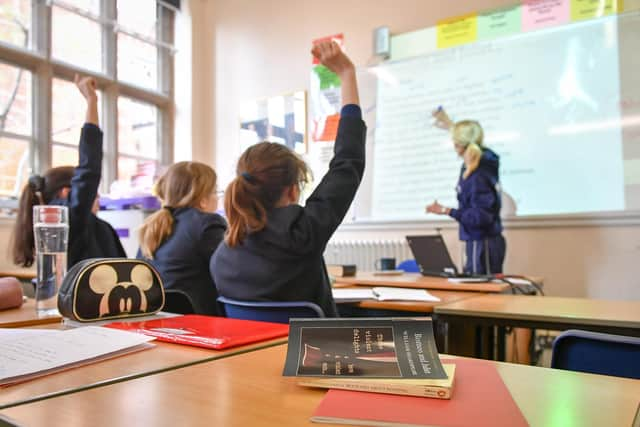Scottish education 'deeply troubled' as close to 5,000 teachers are left on temporary contracts
Scottish ministers and councils have been urged to act as new figures show close to 5,000 teachers face the “intolerable strain” of being stuck on temporary contracts.
Concerns are growing that recent trends in the staffing of Scotland’s schools are creating a “deeply troubled landscape” in education.
Advertisement
Hide AdAdvertisement
Hide AdResearch by the Scottish Conservatives found that 4,951 teachers were employed on temporary contracts as of June 1.


However, the true figure will be even higher, as three councils did not respond to the party’s freedom of information requests.
The data points to a continuation of a recent trend in which more than one in 10 teachers in Scotland are in temporary posts.
The statistics have emerged just two weeks after The Scotsman revealed that the number of requests for probationary teachers from Scottish councils had soared by 44 per cent since 2017/18.
Even more dramatic rises were recorded by some authorities, with the number of requests in Aberdeen and Moray having trebled in the period, while they had more than doubled in Dundee, Midlothian, North Lanarkshire and South Ayrshire.
There was a 65 per cent increase in Edinburgh, a rise of 40 per cent in Glasgow and a jump of 34 per cent in Fife.
The increases have been recorded despite vast numbers of newly-qualified teachers struggling to find work in Scotland.
It is claimed that cash-strapped councils have been seeking to plug gaps with temporary teachers because they can not afford to offer full-time contracts.
Advertisement
Hide AdAdvertisement
Hide AdData shows that in 2021/22 only about half of secondary teachers were in full or part-time employment in the September after qualifying, while in primary it was just 20 per cent.
Tory education spokesman Liam Kerr said: “Our teachers are the backbone of Scotland’s education system, but they have been badly let down by 16 years of SNP neglect.
“Standards have slipped across the board, classroom violence has spiralled out of control and we have seen an alarming number of stress-related absences among school staff on the SNP’s watch.
“And now it has emerged that thousands of teachers are stuck on temporary contracts.”This just adds to the intolerable strain that teachers are already operating under, as it fuels job insecurity, while denying pupils stability and continuity.”
The struggles faced by temporary teachers were brought into sharp focus when North Lanarkshire Council provoked a backlash by e-mailing 80 primary teachers and 50 secondary teachers on a Friday afternoon before the summer holidays to say they would not have contracts from August.
Andrea Bradley, general secretary of the Educational Institute of Scotland (EIS), the nation’s largest teaching union, said the actual number of temporary teachers is believed to be higher than the 13 per cent recorded in Scottish Government census statistics for last year.
"This, together with an overall decrease in teacher numbers, despite Scottish Government promises to increase them, and coupled with the biggest drop in post-probation employment in over a decade, points to a deeply troubled landscape in the staffing of education as a vital public service,” she said.
"Education needs to be properly funded at all times, but particularly as recovery from the pandemic continues, Scotland needs more permanent teachers, not fewer, to tackle the impact of Covid on young people’s learning.
Advertisement
Hide AdAdvertisement
Hide Ad"However, the scarcity of permanent jobs is forcing many teachers either to move to other countries which welcome their skills as teachers with open arms, or they are leaving the profession entirely in search of greater job security amidst the cost of living crisis, or their wellbeing and morale is being ground right down as they struggle to cope with precarious income and uncertain futures.
"Teachers in these positions are saying that they feel grossly under-valued and are being treated as ‘disposable’.”Ms Bradley added: “The Scottish Government and local authorities need to work together to ensure that Education is properly funded and staffed, instead of playing politics with people’s lives.”
The Scottish Government sets targets for student teacher numbers each year and has promised to increase overall teacher numbers by 3,500 by 2026.
But there have been concerns that the recent teacher pay deal means the same money buys councils fewer staff, while other attainment funding is not rising with inflation.
Before end of the last parliamentary session at Holyrood in June, Education Secretary Jenny Gilruth revealed she would be commissioning an “external piece of work” that will consider a range of issues, including “effective local and national teacher workforce planning”, pupil to teacher ratios and the projected decline in the number of school-aged children in Scotland.
She told MSPs: “We must ensure that we have in place an education workforce that enables us to progress our commitments on reducing class teachers’ contact time, on raising attainment overall, on closing the poverty-related attainment gap and on improving additional support for learning, while delivering maximum value for money.”
A Scottish Government spokesperson said: "Over the past ten years the number of teachers in permanent posts has remained fairly stable at over 80 per cent.
"The Scottish Government is supporting councils with an additional £145.5 million in this year's budget to protect increased teacher numbers. Where this is not being delivered by a local authority, we will withhold or recoup funding given for this purpose. This £145.5 million assures funding for councils and removes this as a barrier to employing staff on permanent contracts.
Advertisement
Hide AdAdvertisement
Hide Ad“More broadly the Education Secretary has discussed the national picture on recruitment with Cosla, and she looks forward to working with our Councils on the issue of recruitment and retention – noting that it is they who employ our teachers and not the Scottish Government.”
Comments
Want to join the conversation? Please or to comment on this article.
